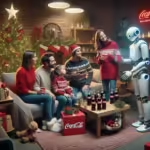Understanding the Controversy Surrounding Coca-Cola’s AI Holiday Ad
In a rapidly evolving digital world where technology intertwines with creativity, Coca-Cola’s AI-driven holiday advertisement has sparked considerable debate and backlash. This controversy emerges amidst the brand’s broader “Real Magic” campaign, raising important questions about the role of artificial intelligence in marketing and creative expression.
What is the Real Magic Campaign?
The Real Magic campaign by Coca-Cola is an ambitious initiative aimed at reinforcing the brand’s core values of happiness, connection, and community. Launching during a time when global communities are dealing with fragmentation and disconnection, the campaign aims to inspire a sense of unity and shared experience, encapsulated within the cherished moments of sharing a Coca-Cola.
Key elements of the campaign include:
The Introduction of AI in Holiday Advertising
In an attempt to innovate, Coca-Cola incorporated artificial intelligence technology into their holiday advertisement, marking a bold step in the brand’s marketing strategy. The ad showcases how AI can contribute to producing dynamic and creative content that resonates with audiences.
AI’s role in this holiday ad includes:
The Promise of AI in Marketing
Artificial intelligence offers immense promise in the field of marketing. By analyzing vast amounts of data, AI can:
However, with great power comes the responsibility to use AI ethically and creatively. This is where the line becomes blurred for many, triggering the current backlash against Coca-Cola’s holiday ad.
Reasons Behind the Backlash
Despite the intended innovation, Coca-Cola’s AI holiday ad has encountered significant backlash. The criticism revolves around several key areas, leading to a discourse about the appropriate use of technology in advertising.
Loss of Authentic Human Touch
One of the primary criticisms is the perceived loss of authenticity and human touch. Traditional holiday ads are cherished for their warmth and personal connection. Critics argue that AI-generated content lacks the emotional depth and genuine sentiment typically evoked by human artists.
Concerns About Data Privacy
The use of AI often involves data collection, and this has raised concerns about privacy and consumer rights. Critics worry that:
Artistic and Creative Integrity
Art is inherently subjective, and Coca-Cola’s decision to rely on AI for creativity has sparked debates about the future of artistic expression. Critics point to:
Navigating the Balance: Coca-Cola’s Response
Recognizing the backlash, Coca-Cola has started to engage in dialogues with both consumers and industry experts to address these concerns. Their response aims to create a balance between innovation and tradition, ensuring that technology remains an enhancer rather than a replacement in creative processes.
Re-evaluating AI’s Role in Future Campaigns
In response to the feedback, Coca-Cola is likely to:
Emphasizing Transparency and Data Security
To alleviate privacy concerns, Coca-Cola is expected to:
Inviting Collaborative Creativity
Coca-Cola may opt to use this opportunity to foster collaborative creativity by:
The Future of AI in Advertising
The controversy surrounding Coca-Cola’s AI holiday advertisement highlights the broader challenges and opportunities that AI presents in advertising. While AI offers a range of innovative possibilities, brands must navigate ethical considerations to maintain consumer trust and engagement.
In the evolving landscape of digital advertising, companies like Coca-Cola will need to strike a sensitive balance between technological advancement and the retention of foundational human values in their campaigns. Only then can they leverage AI’s potential while continuing to resonate on a profound emotional level with their global audiences.
Ultimately, the path forward will involve learning from this experience, adapting strategies, and a renewed commitment to fostering genuine connections through both technology and tradition.








